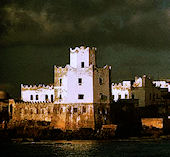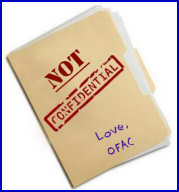 It is not only birds that return in springtime. Calmer weather on the Indian Ocean guarantees a springtime efflorescence of Somali pirate skiffs and attacks on commercial shipping off the coast of Somalia. Pirates have already grabbed a supertanker (with $170 million of crude oil) and some profoundly stupid Somali pirates attacked a Navy cruiser last week. (Buh-bye, little pirate boats!)
It is not only birds that return in springtime. Calmer weather on the Indian Ocean guarantees a springtime efflorescence of Somali pirate skiffs and attacks on commercial shipping off the coast of Somalia. Pirates have already grabbed a supertanker (with $170 million of crude oil) and some profoundly stupid Somali pirates attacked a Navy cruiser last week. (Buh-bye, little pirate boats!)
Whether or not the timing of yesterday’s announcement of new smart sanctions on Somalia was prompted by the recent uptick in piracy or whether the timing was coincidental is impossible to say. In any event, the White House issued Executive Order 13536, which imposed new blocking sanctions on eleven Somali militants. The militants had so many aliases that the new designations led to 211 new entries on the Specially Designated Nationals (“SDN”) list. And the Executive Order authorizes future designations by the Treasury Department’s Office of Foreign Assets Control (“OFAC”) of anyone that threatens the security and stability of Somalia by, inter alia, delivering arms to Somalia or interfering with the Djibouti Agreement, peacekeeping missions in Somalia (such as AMISOM), or the delivery of humanitarian aid in Somalia.
The Executive Order additionally allows designations of parties engaged in piracy off the coast of Somalia on the grounds that these activities also threaten the security and stability of Somalia. This has led some reputable sources, such as Business Week, to speculate that the Executive Order prohibits the payment of ransoms to Somalia pirates.
“The wording could definitely be construed to make payments of ransoms illegal,†[a New York lawyer] who negotiated a ransom payment with Somali pirates for a U.S. owned ship hijacked in 2008 said in a telephone interview. “The wording is just vague enough to give the Treasury some flexibility in how they apply it.â€
Er, no. Absolutely not. The order only covers payments to persons who have been specifically designated by OFAC on the basis of a determination that those persons have previously engaged in piracy. Paying ransom to an undesignated pirate isn’t covered or prohibited by the order. The language here not only is not vague but also it follows the well-established pattern of similar orders which only cover individuals after they have been designated by OFAC and placed on the SDN list.
What is the chance that Treasury would issue such a designation between the time that a ship was hijacked and a ransom was paid? I think it is quite small. OFAC’s goal here seems to be more to prevent Somali pirates from using their ill-gained assets once obtained rather than to risk destruction or loss of commercial vessels by interdicting the ransom payment in the first place.

 Posted by
Posted by  Category:
Category: 

 SEE IMPORTANT UPDATE AT THE END OF THIS POST
SEE IMPORTANT UPDATE AT THE END OF THIS POST My colleague Stan Marcuss
My colleague Stan Marcuss  An interesting
An interesting 


